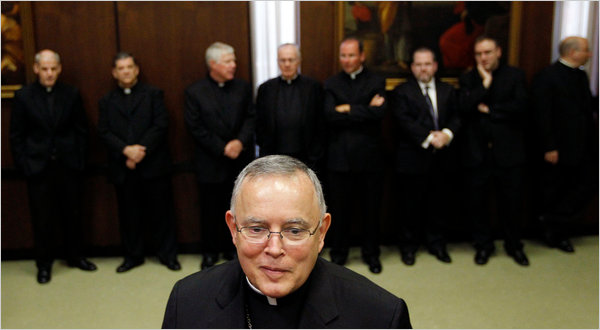By Laurie Goodstein
New York Times
July 19, 2011
http://www.nytimes.com/2011/07/20/us/20chaput.html
 |
| For Philadelphia Archdiocese, a Powerful Conservative Voice |
Before he was named on Tuesday to lead the prominent but troubled Archdiocese of Philadelphia, Archbishop Charles J. Chaput spent the last 14 years in Denver establishing himself as one of the nation’s most prominent advocates of a politically engaged and conservative Catholicism.
He is among a minority of Roman Catholic bishops who have spoken in favor of denying communion to Catholic politicians who support abortion rights. He helped defeat legislation that would have legalized civil unions for gay couples in Colorado. And he condemned the University of Notre Dame, a Catholic institution, for granting President Obama an honorary degree in 2009 because of his stance on abortion.
For these and other decisions stands, Archbishop Chaput has been hailed as a champion by not only Catholic conservatives, but also by evangelical Protestants.
But it would be wrong to believe that the Vatican has given him the prominent posting in Philadelphia solely in the service of politics. The archbishop has been frequently tapped to investigate internal church problems. It is a profile that could serve him well in Philadelphia, where a grand jury accused the archdiocese of a widespread cover-up of sexual abuse and indicted a top church administrator.
“Clearly the appointment does mean a kind of strong, new conservative voice in one of the church’s most important jobs,” said John L. Allen Jr., senior correspondent of the National Catholic Reporter, who lives in Denver and reports frequently from the Vatican.
“But if the sexual abuse crisis is your filter,” Mr. Allen said, “the narrative is that you’ve got a strong reformer and trusted administrator who is going to clean house.”
In the past 10 years, the Vatican has appointed Archbishop Chaput to serve on three high-profile investigations, known as visitations: of American seminaries in the wake of the sexual abuse scandal; of the Legion of Christ after the group’s founder was discovered to have sexually abused seminarians, fathered children and embezzled money; and, most recently, of Bishop William Morris of Australia, who had said publicly that the church should consider ordaining women and married men (the investigation resulted in his removal).
Advocates for sexual abuse victims, however, bristle at the characterization of Archbishop Chaput as a reformer. They point out that he fought hard against legislation in Colorado that would have extended the statute of limitations for people who say they were sexually abused to sue the church.
In every state that such legislation has been proposed, Catholic bishops have fought it. But Archbishop Chaput went further, taking to the pages of First Things, a religious magazine, to explain his rationale. He argued that the legislation singled out the Catholic Church, when many institutions, especially public schools, were also responsible for extensive sexual abuse of children.
“The people paying for these abuse settlements are innocent Catholic families who had no part in events of the past,” he wrote. “Revenge is not justice, no matter how piously one argues it.”
Archbishop Chaput, who is 66, is known in Denver for a pastoral style that is far more personable than that of the current archbishop of Philadelphia, Cardinal Justin Rigali. Like Cardinal Sean O’Malley in Boston, Archbishop Chaput is a member of the Capuchins, a missionary religious order, though he eschews the long brown habit in favor of the black shirt and white collar.
He has written two books, both advocating that Catholics become more assertive in the public square.
In Denver, Archbishop Chaput has been an innovative evangelist for conservative, orthodox Catholicism, said Tom Reynolds, vice president for mission at Regis University, a Jesuit institution in Denver. He said Archbishop Chaput had started a new seminary program, increased vocations to the priesthood and attracted “neotraditionalist Catholic movements and religious orders” to the Denver area.
“He hasn’t always gotten along well with the folks who are on the liberal end, who want to move forward with Vatican II reforms,” Mr. Reynolds said, referring to the Second Vatican Council.
But Archbishop Chaput has not issued any public sanctions or penalties against theologians, priests or laypeople, Mr. Reynolds said, unlike what has taken place in some other dioceses headed by conservative bishops.
Archbishop Chaput will achieve even greater power and prominence if he is elevated to cardinal, as is traditional for the archbishop in Philadelphia. But he may have to wait a few years until Cardinal Rigali retires as a voting member of the College of Cardinals, at age 80.
Any original material on these pages is copyright © BishopAccountability.org 2004. Reproduce freely with attribution.